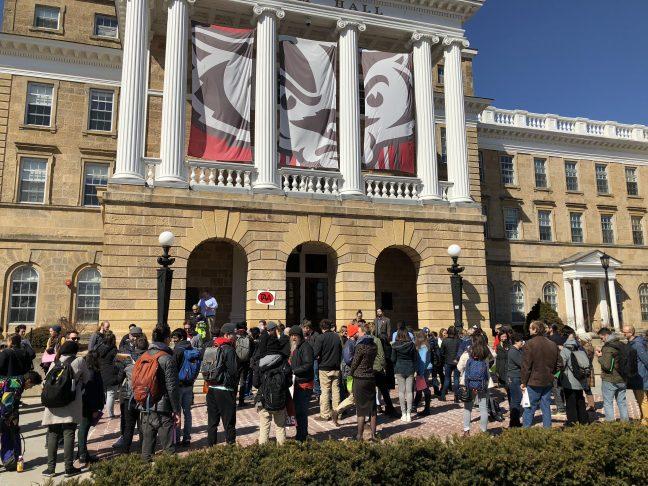After an estimated 400 graduate student workers and allies led by the Teaching Assistants’ Association occupied Bascom Hall earlier this month, the University of Wisconsin administration responded to their requests Monday.
The graduate students demanded a living wage, relief from fees for graduate workers and international students, consistent and quality policies, and a standing committee that includes graduate workers to improve policies.
The UW administration recently added a fee for all international students after increasing their tuition by $1,000 over that of non-resident students. Many graduate workers pay 10 percent of their wages back to the university, according to a press release from TAA.
In the press release, graduate workers called for a greater role in decision-making, since university employment policies directly affect their working conditions.
The TAA-Graduate Worker Union of UW-Madison Facebook page posted Monday a response from the Office of the Vice Chancellor for Finance and Administration. The screenshots of the letters are annotated by TAA, with a stamp that reads “Graded By Union Labor.”
“The response [to the sit-in] failed to address any issues graduate workers brought up during the sit-in and intentionally distorted their demands,” TAA’s Facebook post said.
According to TAA, the university did not acknowledge that the demands came from all graduate workers, not just teaching assistants. The university “refused to formalize workplace policies for graduate workers,” misinterpreted the request for fee relief as cutting off service, “diverged from the democratic norm of shared governance and refused to acknowledge the endorsement of graduate workers’ rights.”
In the letter, Vice Chancellor for Finance and Administration, Laurent Heller and Graduate School Dean William Karpus said no students are exempt from segregated fees. But the TAA said they are not asking for an exemption from these fees. Rather, they are asking the university to pay those fees for them as a condition of employment — a request which would comprise 0.21 percent of the university budget.
Heller and Karpus wrote in the letter that the university has taken steps to invest in graduate students and has tried to match the pay level of peer institutions. The TAA’s press release, however, asserted the annual income of a typical graduate worker is still below the living wage in Wisconsin.
In their letter, Heller and Karpus said the university has gone from having one of the lowest teaching assistant stipends in the Big Ten to being above average.
The stipend for teaching assistants was raised by 8.99 percent for the 2019-2020 academic year, increasing from $18,350 to $20,341.
UW spokesperson Meredith McGlone said fees are important to benefit all students.
“The fairest approach is to provide stipend increases rather than excuse any groups of students from paying the fees that fund important services that benefit all students,” McGlone said.
TAA wrote that many graduate students have other jobs off campus — sometimes two or three — to make ends meet, but many are discouraged from doing so by their supervisors and advisors.
‘Education should be free’: Graduate students protest new segregated fee plan
Reporting from the Wisconsin State Journal offered a glimpse into the life of a fifth-year doctoral student living a “penny-pinching lifestyle.”
Megan Kennedy spent two years on food stamps — a phenomenon not uncommon for other graduate students, who regularly rely on food banks. Additionally, Kennedy could not pay a $700 medical bill because she had to pay her university fees.
Furthermore, one in seven graduate students faces food or housing insecurity, according to the most recent result of UW Campus Climate Survey.
“TAA is the oldest graduate student labor union in the U.S. [sic] and advocates for a university that is fair to all—including students, workers, and our families,” the press release said. “Graduate student workers perform nearly half of all the instruction that takes place at UW, while also taking classes and conducting research. The university works because we do.”


















